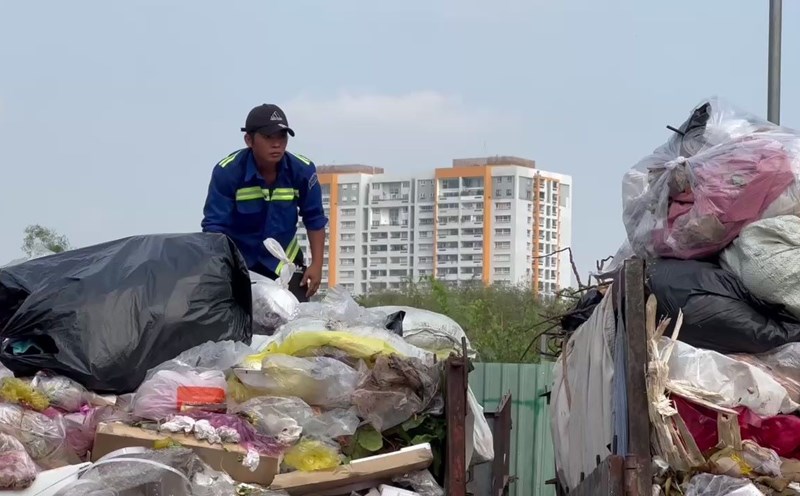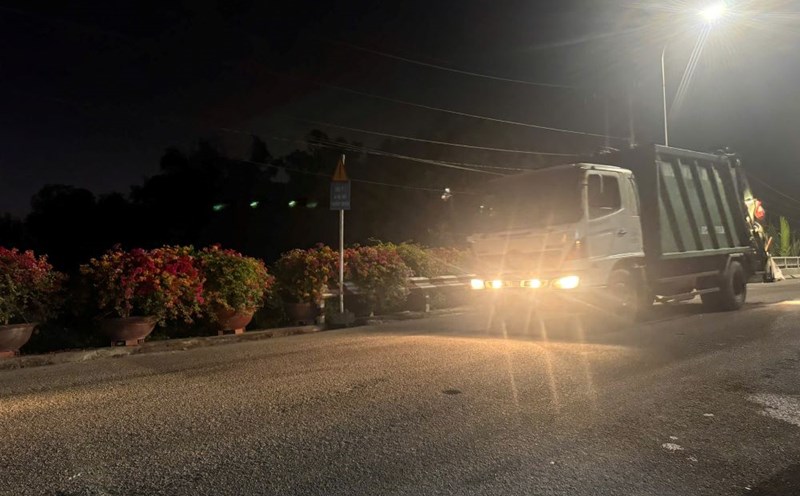According to the Department of Agriculture and Environment, from December 1, 2025, Da Phuoc landfill (Da Phuoc solid waste treatment complex, Hung Long commune) will only receive waste from 6pm to 6am the next morning, instead of receiving it all day as at present.
Currently, there are 14 districts and towns that have previously: part of Thu Duc City, 1, 3, 4, 5, 6, 7, 8, 10, Binh Tan, Binh Thanh, Binh Chanh, Nha Be, Can Gio to bring garbage to Da Phuoc with an average volume of 4,550 tons/day - equivalent to 443 trips, divided into day shifts of 1,800 tons and night shifts of 2,750 tons.
Currently, with a time limit for trucks to circulate, garbage collection, transit and transportation throughout Ho Chi Minh City is carried out for about 17 hours a day.
However, when Da Phuoc landfill does not receive daily shift waste, all 1,800 tons of daily shift waste (equivalent to 175 trips) must be concentrated at night shift.
This makes it difficult for garbage trucks to return to Da Phuoc in time and may have to move to the Northwest Waste Treatment Area, more than 25 km away (from 22 km to 47 km), leading to public service companies being unable to complete the collection, transit and transportation of garbage in one day.
In particular, some districts and towns that previously had landfills such as 1, 3, 5, 10, Binh Thanh, Binh Tan and Nha Be did not have transit stations, forcing garbage trucks to be transported directly to the treatment plant.
These are areas with administrative, commercial, and tourism agencies, often with many events and a large number of visitors, so if garbage collection is not done in time, it will easily cause stagnation on the road and at collection points.
Faced with the risk of garbage congestion, the Department of Agriculture and Environment proposed to coordinate the volume of garbage from some urgent areas to the Northwest Waste Treatment Area, including 5 previous districts: 1, 3, 6, 10 and Binh Chanh. According to this plan, about 447 tons of waste/day (day shift) will be transported from Da Phuoc to the Northwest.
The plan is assessed to be suitable for reality and has received consensus from transportation units, helping to release the amount of garbage collected during the day, reduce accumulation on vehicles, at transfer stations and on the street, and save daily shift human resources.
However, this option is also facing difficulties because the distance to the Northwest Waste Treatment Area is twice as long as Da Phuoc, leading to the time for tanks to turn around, making it difficult to ensure means of transportation.
In addition, the transportation route and distance have not been approved, arising transportation costs, and there are also problems with prohibited hours, prohibited roads and procedures for applying for a permit for inner-city traffic issued by the Department of Construction.
To implement the above plan, the Department of Agriculture and Environment proposed to the Ho Chi Minh City People's Committee a number of solutions to ensure smooth waste transportation activities.
Propose that the Ho Chi Minh City People's Committee direct the Department of Construction to adjust the priority for garbage trucks to continuously circulate or reduce the time limit for vehicles in the inner city to 7:30 - 9:00 (instead of 6:00 - 9:00) and 16:00 - 17:30 (instead of 16:00 - 20:00), ensuring that garbage trucks have about 1 and a half hours before and after the time to enter - exit the waste treatment complexes to transport garbage in time.
The Department of Construction exempts the issuance of an inner-city circulation license for household waste transport vehicles, or if not exempted, the license term will be extended from 3 months/time to 6 - 12 months, while simplifying the licensing procedures.
Propose to temporarily pay 50% of the costs arising from transport units when changing day shifts to night shifts and adjust the route to the Northwest.
Commune-level People's Committees coordinate with collection units and the Project Management Board of the area to adjust collection times at source and inspect and supervise operations at transit stations.











